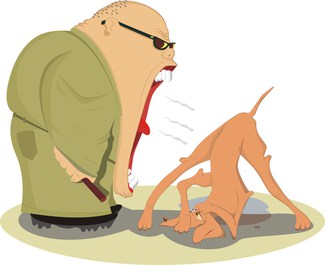Dogs get sad when you yell at them because:
Dogs are capable of basic emotion. When you yell at them, it’s likely to make them sad. It can also make them scared or confused.
Dogs understand short, concise commands, not angry shouting. Yelling at your dog can affect them for longer than the time you yell at them, and cause behavior problems.
Dogs have personalities just like us, and when you shout at them, it can cause all sorts of emotional reactions from them. Shouting at your dog puts them under stress.
This can manifest itself in many ways including:
- Loss of appetite
- A change in bowel movement
- Feelings of isolation
- Aggression
- Lack of energy
All of that from being shouted at is going to make your pooch pretty sad. You will even see a change in their demeanorwhen they get sad, similar to a depressed person.
Your dog is also likely to become fearful of you. Sadly, that means they may not enjoy being around you as much.
Shouting at Your Dog Will Make Them Sad, and More
Many experts agree that shouting at your dog can actually make their behavior worse.
Although dogs have personalities, they are not human. They don’t understand exactly why you are shouting at them. This is especially if you shout all the time.
If you continue to shout, your dog becomes more confused, and it may act out because they’re unsure what to do.
Take for example, calling your dogto you when you’re at the park. If they don’t come back, you continue to shout. When they do come back, you shout at them for not coming back. Your dog gets shouted at for not coming back and for coming back.
You can see why your dog may become stressed and sad because it all depends on the circumstances as to your shouting.
Dogs Feel Emotions Including Sadness

There have been scientific studiesproving dogs feel primary emotions like happiness, sadness, and fear.
It makes sense then that dogs will pick up your anger or frustration when you shout at them, and the corresponding emotions like sadness will occur.
Shouting is not an effective way of disciplining your dog. They won’t necessarily feel bad about what they’ve done, but they will feel sadness because you’re upset.
Dogs want to make you happy, not angry. Dogs are very in tune to your emotions. That is why it’s best to use a calm voice. Dogs don’t learn from you shouting at them, so it’s likely that they will repeat thebehavior that got you upset.
Because dogs are in tune with your emotions, they will be frightened when you shout or be saddened that they have done something to upset you.
Yelling Has Long Term Effects on a Dog

Because dogs are capable of basic emotion, when you yell at them, it’s likely to make them sad.
It can also make them scared or confused. Dogs understand short, concise commands, not angry shouting. Yelling at your dog can affect them for longer than the time you yell at them, and cause behavior problems.
Studies have shown that dogs that are trained with a rewards based program are less stressed and are quicker to complete tasks, than those who receive training with negative reinforcement, such as shouting.
Higher stress levels and more stress-related postures were recorded in dogs in the negative reinforcement training than those in reward based training. This shows that there are definite negative responses from your dog when you shout at them.
Surprisingly, the same study showed that the effect of negative reinforcement training still showed in the dogs a month after the negative reinforcement stopped.
You can imagine the effect of an owner shouting will have on the emotions of a dog who only wants to please them.
Yelling Confuses Your Dog

Dogs don’t have great memories for things like a random action they just did. They remember commands because they have been ingrained into them through repetition and reward.
If they spilled the garbage bag in the kitchen two hours ago, and you come home and yell at them,they will be confused. They forgot they ripped the garbage bag, and think you are shouting at them for being excited you’re finally home.
So, not only is yelling ineffective, it also confuses and saddens your dog because you don’t normally yell at them for being happy you are home.
Hugs for Your Dog Are Better Than Shouting

Rewards based training may take a long time to work, but it’s better than your dog being sad, depressed, or in fear all the time. Regular hugs are preferable to yelling.
There is no real good time to yell at a dog, unless you are interrupting behavior that needs to stop immediately because the dog or someone is in danger. An example would be if your dog is about to run into traffic or charge at a child.
Shouting at your dog may also wind them up. They may interpret your shouting as excitement and join in.
Why Shouting at Your Dog Doesn’t Work
Apart from making your dog sad, yelling at your dog sets your relationship back. Here’s why:
1. It makes no sense to your dog. Dogs respond very well to short, precise commands. If you scream at your dog, the tirade makes no sense to them. Your dog will either be totally confused or frightened.
2. It sets back training goals. Shouting at your dog doesn’t make it change behavior. It saddens and scares it, so the behavior never changes. You need to show the dog an alternative, before praising the new behavior.
3. It makes your dog fear you. Some dogs react very fearfully at being yelled at. This is particularly so for rescued dogs. We rescued our dog after it suffered severe abuse as a puppy. Even 11 years later, she will cower if I raise my voice.
Teaching through short, precise commands with rewards for performance is the way to go.
4. It may encourage their bad behavior. If your dog is barking and you shout loudly at them, they may consider that as you joining in. If you shout when they are being destructive, your shouting may make them more excited and increase their destructive efforts.
Consistency is Better Than Yelling
Training a dog with reward based principles is my preferred method. If you do this, but then yell at your dog, they will become very confused.
Dogs need stability and calmness, even in training. If you allow your dog to sleep on your bed, but then one day shout at them for getting on, they won’t understand. They won’t know you don’t want them on the bed that one time. They just think they have upset you and will be confused, scared, sad – or all three.
Did you know dogs can be mad at you also? Dogs are emotional creatures and get sad and upset at you sometimes. This is handy to know because you may think your dog is being naughty and then you shout at them.
Some of the common signs of your dog being angry at you are:
- Constant Yawning. You may think this is a sign of tiredness, but constant yawning is a sign your dog is getting distressed or angry.
- Constant Lip Licking.This can be a warning your dog is angry when there is no food around for them to salivate and lick their lips. It often happens when people the dog doesn’t know crowd around them or hug them. Remove your dog from this situation.
- Refuse to make eye contact. If someone turns their back on you and refuses to look at you, you’d understand they are angry at you. It’s the same with dogs. If they are upset with you, they may choose to look away from you and not engage in eye contact.
- Tucked in tail. If you have just scolded your dog and their tail is between their legs, they have taken your scolding to heart. Speak softly to reengage their attention.
- Flattened ears. If your dog flattens their ears against their head and their mouth appears tight, they are mad at you. Dogs communicate with body language, so it’s important to pay attention.
Conclusion
Dogs have unique personalities and can get sad, along with many other basic emotions. When you yell at them, they don’t understand why you are doing it.
Apart from sadness, you are likely to cause confusion and fear in your dog. All of these may combine to excite your dog and increase bad behavior.
Consistency is key to doggie success.
Writer: Craig Taylor

Sources
- https://www.dogtrainingme.com/never-yell-at-your-dog/#:~:text=Even%20if%20you%20are%20shouting,may%20become%20scared%20of%20you.
- https://www.hillspet.com/dog-care/behavior-appearance/do-dogs-feel-guilt-or-shame
- https://www.cracked.com/article_18551_6-well-intentioned-ways-youre-ruining-your-dog.html
- https://www.you.co.uk/never-shout-at-your-dog/
- https://petcentral.chewy.com/training-training-tips-5-reasons-you-should-never-scold-your-dog/
- https://www.rd.com/list/signs-your-dog-is-mad/

